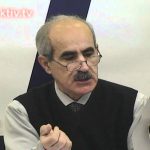By Elmar Chakhtakhtinski  Ever since the collapse of Soviet Union, its former republics have been described as “transitional democracies” or “young democracies”. This underscored the genuine hopes for transformation of those societies and their integration into the community of free nations. But whatever Azerbaijan might have been transitioning into for the past twenty years, democracy was surely scratched off as the intended destination long time ago. Such is the result of an increasingly awkward imitation of “democracy building” played by the authorities in Baku in front of the international community.
Ever since the collapse of Soviet Union, its former republics have been described as “transitional democracies” or “young democracies”. This underscored the genuine hopes for transformation of those societies and their integration into the community of free nations. But whatever Azerbaijan might have been transitioning into for the past twenty years, democracy was surely scratched off as the intended destination long time ago. Such is the result of an increasingly awkward imitation of “democracy building” played by the authorities in Baku in front of the international community.
We have a system where modern government institutions only serve as a facade for a backwards clan based authoritarian rule. The “elected” president simply inherited this post from his deceased father after falsified elections and violent suppression of protests. Since 2009, after hastily conducted “constitutional referendum”, there are no term limits preventing him from becoming a life-long ruler. The parliament, on paper an elected legislature with powers to check and balance those of the president, is a rubber-stamp body of pro-government deputies where no true debate and deliberation takes place.
All parliamentary, presidential and municipal elections held under Aliyev dynasty rule were marred by wholesale government-organized fraud. The judiciary consists entirely of judges appointed by the executive and legislative branches “elected” in those fraudulent polls. Not surprisingly, the courts are seen to act under government orders, issuing strict verdicts against dissenters, approving questionable election results and passing judgments in favor of government officials.
Thus, none of the branches of government derive their legitimacy from the free will of people; neither do they operate according to their formally prescribed functions.
But efforts to build “democracy” do not stop there. Dozens of fake “opposition parties” tirelessly express their ardent support for the country’s leadership. During the last presidential elections campaign one such “candidate” proudly displayed the portrait of the incumbent president Ilham Aliyev in his office while giving a TV interview. Many government organized NGOs, or “GONGO”s exist solely to provide positive opinions about the authorities record on human rights and other subjects.
The existence of several TV and radio stations and numerous printed publications competing among themselves in issuing praises for the president and his family members and attacking “radical” (i.e. real) opposition and “foreign agents” is presented as evidence of free speech. In reality, there is no independent radio or television and very few remaining opposition newspapers are subjected to constant arrests, closures and fines. All protest rallies are violently attacked by police and civilian clothed government agents. So little dissent is tolerated that a well-known scientist Rafig Aliyev was recently fired from his faculty chair job at a university after he led a forum of local intellectuals gathered to express concern with the direction their country is heading towards.
Not only the government failed to deliver the long-promised political reforms, but it leads an orchestrated effort to create an illusion of them and present it to the world as the “real thing”.
One of the latest acts of this theatrical show is the regime’s proclaimed “anti-corruption” campaign. Never mind that the president’s own teenage kids were recently found to possess $75 million luxury villas in Dubai and a controlling stake in the country’s largest banks and holding companies. That bribery and theft of public funds has practically become a way of life for bureaucrats of all levels does not stop the Azerbaijani government from claiming it fights corruption. And who cares that it sounds as convincing as if Taliban ever claims to engage in a struggle against religious extremism.
It is unfortunate to see any US or European leader or diplomat play along in this game of pseudo-democracy and overlook the disgraceful situation with human rights in favor of other priorities. This not only fuels anti-western sentiments promoted by any pro-Russian and pro-Iranian forces, but also exasperates the damage done to the basic ideas of free society and institutions of democratic governance, disorienting and demoralizing the Azerbaijani public. Most importantly, it prevents the formation of real institutions of civil society capable of formulating a viable social contract between different forces and implementing meaningful reforms.
Some might hold vain hopes that if enough lip service is paid to democracy by corrupt dictatorships, it might eventually materialize into something tangible. The example of Azerbaijan proves just the opposite. Almost two decades have passed; Azerbaijan was allowed into the Council of Europe and signed up numerous treaties obliging it to respect fundamental rights and freedoms of the citizens. However, we are yet to witness anything resembling free and fair elections or flourishing independent media. On the contrary, the latest parliament does not contain even the very few real opposition members the previous ones had, western radio stations – the very last remnants of broadcast media outside of the government control – have all been shut down, journalists have been beaten, jailed and murdered, and the growing number of activists is sent behind bars.
This brings us to the only logical conclusion: Aliyev government has no intention to ever change – not now, not any time in future. The eighteen long years of unrelenting repressions and pervasive corruption make this point quite clear.
“We address your energy and security needs and pretend to work towards democratic development, you pretend to believe it (or at least keep quiet about it)” – this is the grand bargain Azerbaijani leadership offers to its western partners. But as Arab Spring showed, such arrangements might prove futile and then the US and its allies can end up facing eerie uncertainty trying to catch up with exploding public unrest. It might well be worth not to wait and start calling the spade a spade now.
(Azerireport)



